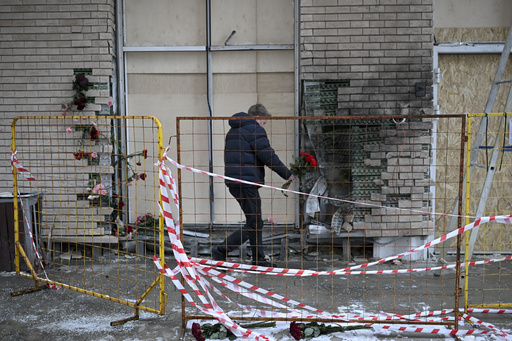
The assassination of a high-ranking Russian general in a bombing outside his residence in Moscow marks one of the most audacious strikes against a senior military figure, bringing the ongoing conflict in Ukraine even closer to the Russian capital.
Here’s a brief overview of the incident and key details about those involved:
What transpired?
On Tuesday morning, Lieutenant General Igor Kirillov was killed by a bomb concealed on an electric scooter positioned near the entrance of his apartment building in southeastern Moscow as he was leaving for work. The general’s assistant also perished in the explosion.
The explosive device was remotely detonated, according to Russia’s Federal Security Service (FSB). A video captured by a car-mounted camera documented the moment the two men exited the building just before the blast occurred.
Who were the victims?
At 54, Kirillov served as the head of Russia’s Radiation, Biological and Chemical Protection Forces, which are responsible for shielding the military from threats posed by nuclear, chemical, and biological weapons and ensuring safety in contaminated environments.
He was under sanctions from several nations due to his involvement in the conflict in Ukraine. Recently, Ukraine’s Security Service announced a criminal investigation against him, accusing him of orchestrating the use of prohibited chemical weapons.
While Russia has denied any allegations of chemical weapon usage in Ukraine, it has accused Ukraine of employing them. Kirillov, who took his position in 2017, was a prominent figure making these accusations, holding several briefings where he accused the Ukrainian military of using toxic substances and intending to deploy radioactive materials — assertions that both Ukraine and its Western allies have dismissed as disinformation.
Alongside Kirillov, his assistant, Ilya Polikarpov, was also killed in the blast.
Who has taken responsibility?
An official from Ukraine’s SBU claimed that the agency orchestrated the bombing. Speaking under condition of anonymity, the official referred to Kirillov as a “war criminal” and termed him a legitimate target. They also provided video footage of the incident.
Who has been arrested?
On Wednesday, the FSB announced the detention of a suspect, an Uzbek citizen born in 1995, who was later identified as Akhmad Kurbanov by Russian news agencies Tass and RIA-Novosti. According to the FSB, this individual claimed to have been recruited by Ukrainian special services. The circumstances surrounding his confession remain unverified.
The FSB stated that the suspect was promised a $100,000 reward and relocation to a European Union nation for his role in Kirillov’s killing. He allegedly traveled to Moscow on directives from Ukraine, where he acquired a homemade explosive, placed it on an e-scooter, and set it near Kirillov’s apartment.
Furthermore, the suspect rented a vehicle to observe the situation while using a camera to livestream to coordinators based in the Ukrainian city of Dnipro, triggering the bomb at the moment Kirillov exited the building. The FSB revealed that the suspect could face life imprisonment.
Reports from Russian media indicate that the FSB pinpointed the suspect’s whereabouts by examining surveillance footage and mobile phone communications.
What remains unclear?
The exact method by which the suspect was recruited has not been disclosed by the FSB. Detained in a village in the Moscow region, as reported by an Interior Ministry official, it remains unknown where he is currently being held or when he will face court proceedings, which could occur shortly to establish the conditions of his pre-trial detention. Under Russian law, one can only be held in custody for 48 hours before a court ruling is required.
What reactions has there been from Russia?
Russian officials have labeled the bombing a “terrorist act.” The Kremlin asserted that it was plain that Ukraine was involved in Kirillov’s assassination, with spokesperson Dmitry Peskov claiming that Kyiv employs terrorist tactics.
Although President Vladimir Putin has yet to make a public statement regarding the attack, Peskov noted that he expressed condolences over Kirillov’s death. Furthermore, Dmitry Medvedev, the deputy head of Russia’s Security Council, characterized the attack as an effort by Kyiv to divert attention from its military setbacks, cautioning that Russia’s political and military leadership would face certain retribution.
Vyacheslav Volodin, the speaker of the lower house of parliament, paid tribute to Kirillov, labeling him a dedicated military professional and patriot who significantly enhanced the effectiveness of the nation’s defense forces in the realms of radiation, chemical, and biological safety.
